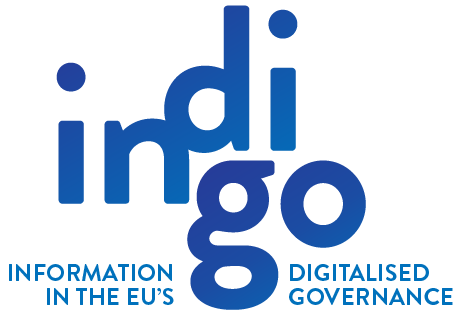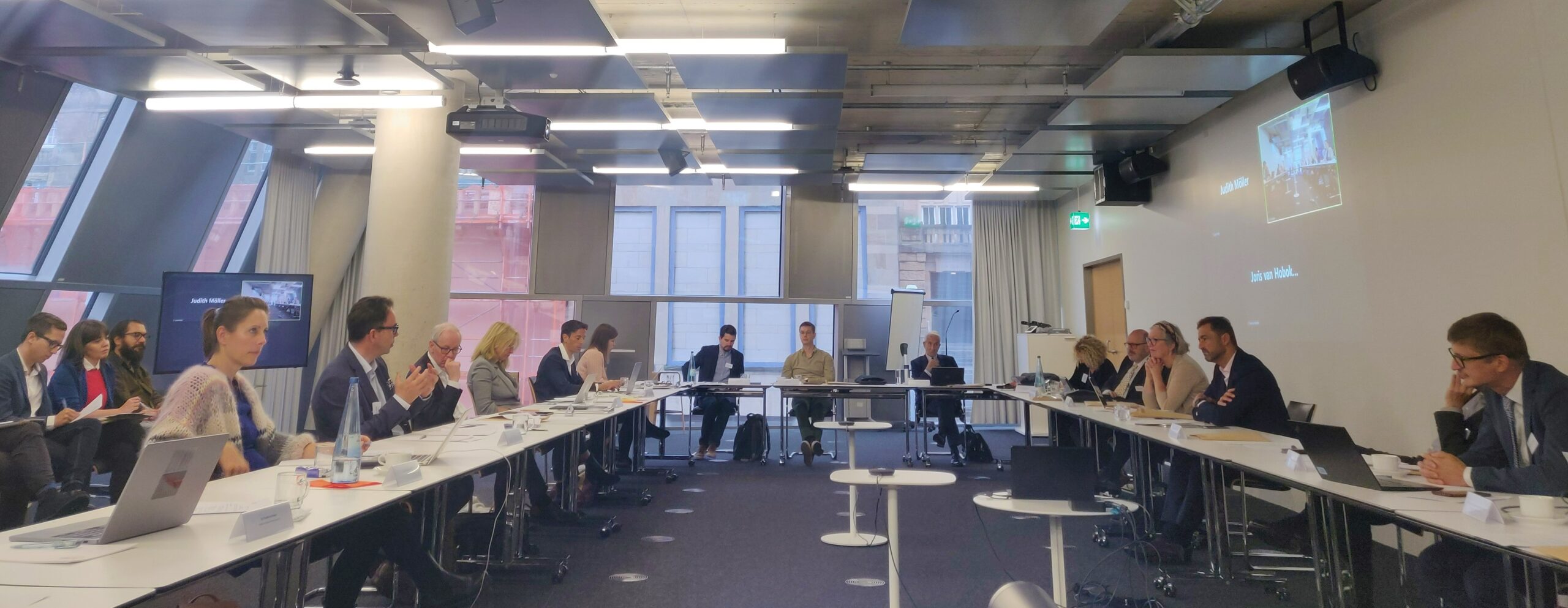September 29-30, 2022
On September 29-30 at the University of Freiburg took place the INDIGO Project third big come-together – the second hybrid type internal annual Conference.
The main purpose of the two-days Conference was to intensively discuss the draft papers in order to realise the peer-review and to provide in-depth feedback for the authors. In order to achieve this aim effectively, all of the draft papers and reports were spread between the participants in advance.
On the first day, the participants presented the draft papers intended as chapters for the final INDIGO Project book. Each draft paper presentation was followed by a commentary provided by the commentator. Afterwards followed feedback from the other participants and broader discussions on the draft paper.
The first panel presented on general framework aspects such as Accountability of Cyber-Delegation in European Union Public Law (Prof. Herwig Hofmann) and Algorithms, Automation and Administrative Procedure at EU Level (Prof. Oriol Mir et al).
The following panels (panel 2 – 4) were composed of the presentations of the draft papers build on previous INDIGO work, included on case studies in the various selected EU policy fields impacted by the automated decision making and automatization: EU Border Control, Regulations by Information & RegTech, Political Advertising, Digital Health Infrastructure, Digital Services and AI Systems in the Single EU Market.
Considering the latest EU legislative developments (AI Act proposal, DSA, DMA, GDPR, etc.), the second day was dedicated for the comparative insights in the national developments of the EU Member States. Of interest were national legislative activities, judiciary practice (case law) and soft law concerning automation in the administrative procedures concerning AI/sophisticated algorithms in public decision making.
First professor Paul Craig presented Model Rules on Impact Assessment of Algorithmic Decision-Making Systems Used by Public Administration.
It was followed by the national reports of Italian (Prof. Diana-Urania Galetta), Spanish (Prof. Eduardo Gamero), Austrian (Prof. Franz Merli), Estonian (Prof. Ivo Pilving) and Swedish (Prof. Jane Reichel) perspectives concerning automation in administrative procedures concerning AI/sophisticated algorithms in public decision making. The presentations of the reports were followed by discussions facilitating the mapping of the tendencies of national legislative, judiciary and soft law responses to the automatization, digitalization and the (semi)automated decision making or AI/sophisticated algorithm use by public administration.
We thank to all the participants for the fruitful and exciting exchange!
Programme
THURSDAY 29th OF SEPTEMBER
MORNING SESSION
9.00 – 9.15 Welcome and introduction
Prof. Jens-Peter Schneider, University of Freiburg (Host & PI)
Prof. Herwig Hofmann, University of Luxembourg (Project Leader)
9.15 – 11.00 Panel 1 (hybrid)
Chair: Prof. Jens-Peter Schneider, University of Freiburg
Automated decision making in public law
Prof. Herwig Hofmann, University of Luxembourg
Comments by
Prof. Deirdre Curtin, European University Institute, Florence
Discussion
Algorithms, automation and administrative procedure at EU level
Prof. Oriol Mir Puigpelat (et al.), Pompeu Fabra University, Barcelona
Comments by
Prof. Sofia Ranchordás, University of Groningen
Discussion
11.30 – 13.00 Panel 2 (hybrid)
Chair: Prof. Herwig Hofmann, University of Luxembourg
Automated decision-making in the EU Border Control Context
Prof. Franziska Boehm (et al.), Karlsruhe Institute of Technology (KIT)
Comments by
Dr. Niovi Vavoula, Queen Mary University of London
Discussion
The Changing Nature of ‘Regulation by Information’ and the Rise of Regulatory
Technologies
Prof. Dirk Zetzsche, Dr. Felix Pflücke (et al.), University of Luxembourg
Comments by
Dr. Jannik Woxholth, University of Luxembourg
Discussion
13.00 – 14.30 Lunch break
AFTERNOON SESSION
14.30 – 15.30 Panel 3
Chair: Prof. Franziska Boehm, Karlsruhe Institute of Technology (KIT)
Influencing Decision-Making by Targeting Political Advertising
Prof. Päivi Leino-Sandberg (et al.), University of Helsinki
Comments by
Dr. Judith Möller, University of Amsterdam
Discussion
16.00 – 17.45 Panel 4 (hybrid)
Chair: Prof. Oriol Mir Puigpelat, Pompeu Fabra University, Barcelona
A Digital Health Infrastructure for cross-border Governance of communicable
diseases
Franka Enderlein, University of Freiburg
Comments by
Dirk Meusel, Unit Health Security, DG for Health and Food Safety,
European Commission
Discussion
The new regulatory framework for Digital Services and AI systems in the EU
Single Market
Prof. Jens-Peter Schneider (et al.), University of Freiburg
Comments by
Prof. Joris van Hoboken, University of Amsterdam and Vrije Universiteit
Brussel
Discussion
FRIDAY 30th OF SEPTEMBER
MORNING SESSION
9.00 – 9.45 Panel 5: ELI Model Rules on Impact Assessment
Chair: Prof. Jens-Peter Schneider, University of Freiburg
The ELI Model Rules on Impact Assessment of Algorithmic Decision-Making
Systems Used by Public Administration
Prof. Paul Craig, University of Oxford
Discussion
9.45 – 10.45 Panel 6: The Effect of Automated Decision Making Systems on Basic
Principles in EU Public Law: A Comparative Perspective – I
Chair: Prof. Herwig Hofmann, University of Luxembourg
Automated Decision Making Systems in national Administrative Law
Prof. Diana-Urania Galetta, University of Milan – An Italian Perspective
Prof. Eduardo Gamero Casado, Pablo de Olavide University, Sevilla – A
Spanish Perspective
Discussion
11.15 – 12.30 Panel 7: The Effect of Automated Decision Making Systems on Basic
Principles in EU Public Law: A Comparative Perspective – II
Chair: Prof. Jacques Ziller, University of Pavia
Automated Decision Making Systems in national Administrative Law
Prof. Franz Merli, University of Vienna – An Austrian Perspective
Prof. Ivo Pilving, University of Tartu/Supreme Court of Estonia – An Estonian
Perspective
Prof. Jane Reichel, University of Stockholm – A Swedish Perspective
Discussion
12.30 – 12.50 Closing remarks
Prof. Herwig Hofmann, University of Luxembourg
Prof. Jens-Peter Schneider, University of Freiburg

